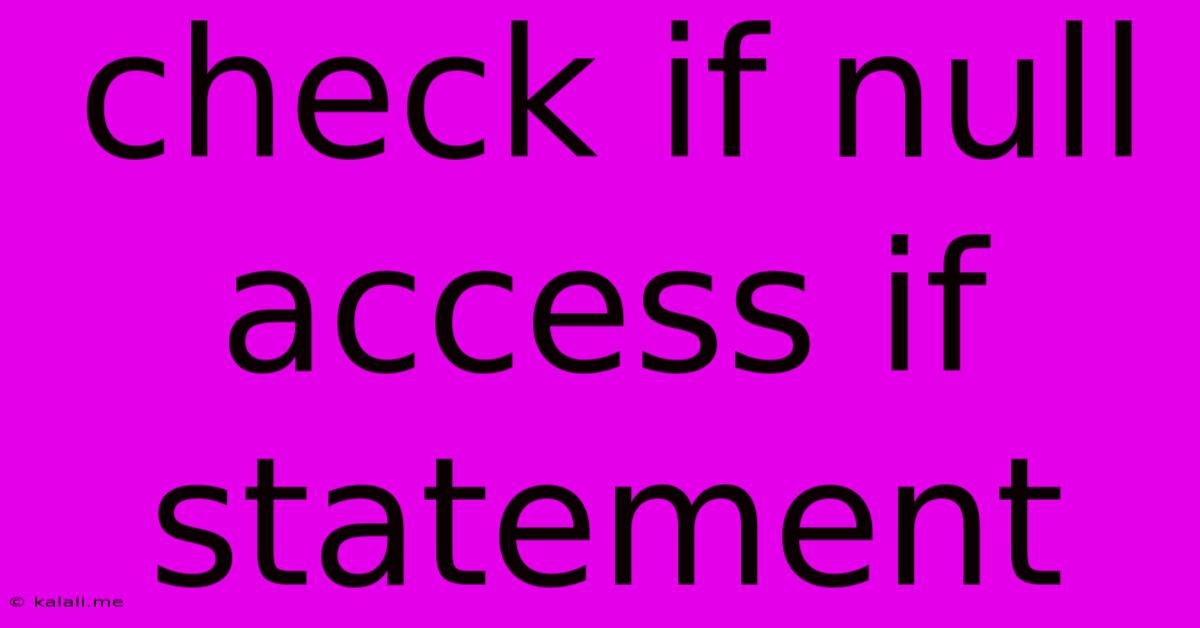Check If Null Access If Statement
Kalali
Jun 01, 2025 · 3 min read

Table of Contents
Checking for Null Access: Mastering if Statements for Null Safety
Null pointer exceptions are the bane of many a programmer's existence. They're frustrating, unexpected, and can bring even the most robust application crashing down. This article dives into the best practices for safely handling potential null values in your code, focusing on how to effectively utilize if statements to prevent these dreaded exceptions. We'll explore various approaches and highlight the most efficient and readable methods.
Understanding the Problem: Why Null Checks Are Crucial
Before jumping into solutions, let's understand why null checks are so vital. A null pointer exception occurs when your code tries to access a member (like a method or property) of an object that is currently pointing to nothing – it's essentially trying to access something that doesn't exist. This typically happens when a variable hasn't been properly initialized or when a method returns null unexpectedly.
Effective if Statement Techniques for Null Safety
Here are several ways to use if statements to gracefully handle potential null values:
1. The Basic Null Check:
This is the most straightforward approach. You directly check if a variable is null before attempting to access its members.
String name = someMethodThatMightReturnNull();
if (name != null) {
System.out.println("The name is: " + name.toUpperCase());
} else {
System.out.println("The name is not available.");
}
This approach is clear and easy to understand, making it ideal for simple scenarios.
2. The Elvis Operator (?:): A Concise Alternative
Many languages offer a concise "Elvis operator" (?:) for handling null checks. This operator provides a shorthand way to assign a default value if the variable is null.
val name: String? = someMethodThatMightReturnNull()
val uppercaseName = name?.toUpperCase() ?: "Name not available"
println("The name is: $uppercaseName")
In Kotlin (and similar languages), this elegantly assigns the uppercase version of the name if it's not null; otherwise, it defaults to "Name not available".
3. The Safe Navigation Operator (?.)
Languages like Kotlin and Swift provide a safe navigation operator (?.) to avoid null pointer exceptions. This operator only accesses the member if the object is not null.
val name: String? = someMethodThatMightReturnNull()
val length = name?.length ?: 0 // length will be 0 if name is null
println("The length of the name is: $length")
This prevents the null pointer exception by simply skipping the access to length if name is null.
4. The Optional Class (Java): Advanced Null Handling
For more complex scenarios, consider using the Optional class in Java. Optional explicitly represents the absence of a value, providing methods like isPresent() to check for null and orElse() to provide a default value.
Optional name = Optional.ofNullable(someMethodThatMightReturnNull());
String uppercaseName = name.isPresent() ? name.get().toUpperCase() : "Name not available";
System.out.println("The name is: " + uppercaseName);
//Alternatively using orElse
String uppercaseName2 = name.map(String::toUpperCase).orElse("Name not available");
System.out.println("The name is: " + uppercaseName2);
Choosing the Right Approach:
The best approach depends on the context:
- Simple null checks: The basic
ifstatement is sufficient. - Concise null handling: The Elvis operator is perfect for assigning default values.
- Avoiding null pointer exceptions elegantly: The safe navigation operator is ideal.
- Complex null handling and potentially null return values: Consider using the
Optionalclass (Java) or similar constructs in other languages.
By mastering these techniques, you can significantly improve the robustness and reliability of your code, eliminating the frustration and unexpected crashes caused by null pointer exceptions. Remember to always prioritize clear, readable code that effectively handles potential null values.
Latest Posts
Latest Posts
-
Difference Between A Nook And A Cranny
Jun 02, 2025
-
How To Stop Dog Digging Grass
Jun 02, 2025
-
Chinese Character That Looks Like A Z
Jun 02, 2025
-
Does Everyone Have A Guardian Angel
Jun 02, 2025
-
Height Of Electrical Panel From Floor
Jun 02, 2025
Related Post
Thank you for visiting our website which covers about Check If Null Access If Statement . We hope the information provided has been useful to you. Feel free to contact us if you have any questions or need further assistance. See you next time and don't miss to bookmark.